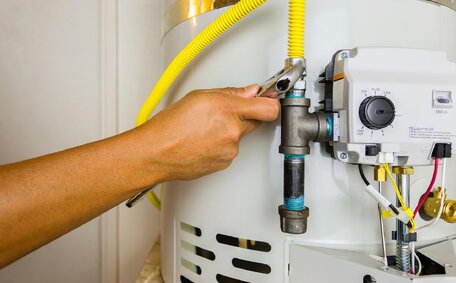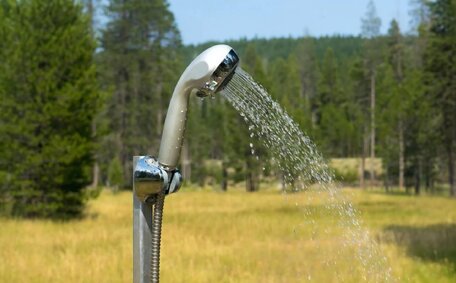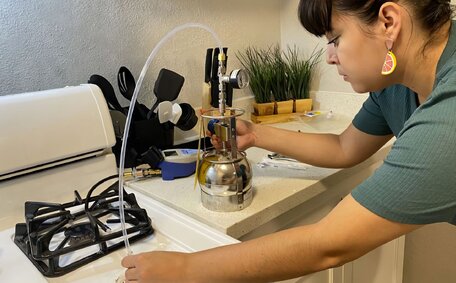Identifying Plumbing Emergencies and Associated Health Hazards
Immediate action is crucial in plumbing emergencies to safeguard health and mitigate property damage. Exposure to mould, bacteria, and toxic gases from sewage backups, gas leaks, or burst pipes necessitates rapid response.
Recognising signs of a plumbing disaster ensures swift and effective action. Foul odours, soggy ceilings, loud sounds near pipes, and changes in water pressure could indicate a looming plumbing emergency.
Professional help is essential when plumbing issues like backed-up sewage escalate to mould growth and illness spread. Gas leaks can pose serious risks, including potential explosions and poisoning dangers. Burst pipes unleash floods carrying pathogens that can cause serious health issues for skin and lungs.
Understanding how to quickly shut off main water, gas, and electricity can significantly reduce the risk of exacerbating the situation. Wearing protective clothing such as rubber gloves and boots during clean-up blocks bacteria and enhances safety.
It is imperative to call professional plumbers promptly to rapidly mitigate threats as they are skilled at stopping leaks and safely removing contaminated water.
Sewage Backups
E. coli, Hepatitis A, Salmonella, and other harmful bacteria from sewage can cause severe diarrhoea, vomiting, and fever upon contact or inhalation. Promptly addressing sewage backups is crucial to prevent lung infections and immune system suppression from mould toxins.
Few plumbing disasters can cause water damage and jeopardise health like sewage backups, with raw sewage being a prime culprit.
Contaminants stick to everything they contact. Carpets, walls, furniture, toys, clothes, and more become breeding grounds for dangerous germs. Water-induced slippery spills can lead to slips, trips, and falls, with 25% of home plumbing emergency victims injured annually.
If foul water starts flooding from drains or toilets, it’s important to know immediately when to call for professional assistance to ensure safety. Contact emergency services and 24/7 emergency plumbers like Blakehurst Plumbing to ensure safe containment of backups. Our professional techniques help ensure your home remains safe and sanitary by using top-notch gear to clear blockages, properly cleaning with disinfectants, and extensively drying all areas to resist mould infestations.
Contaminated Water
It is essential to be aware that plumbing emergencies can introduce hazardous substances like bacteria, chemicals, and sediment directly into your water supply. Consuming contaminated water long-term heightens your risk of gastrointestinal, reproductive, and neurological disorders. Acute poisoning is also possible if high toxin levels enter water suddenly, which a plumber can assess and resolve.
Common causes that can cause water system compromises include burst supply lines allowing groundwater infiltration, faulty treatment equipment like corroded filters, and undesirable cross-connections between sewage and potable flows. Flooding can also spread infectious organisms through water. Should you notice any cloudiness, odd smells/tastes or experience skin/stomach irritation after using water, these could be signs of significant discomfort and contamination.
Daily maintenance, including protecting infrastructure from storms and wear by installing shutoff valves, prevents contaminated water. Regular inspections can detect early defects before they lead to contamination, ensuring your plumbing system remains in excellent condition. Devices such as backflow preventers and leak detectors are essential for maintaining a sound and contamination-free plumbing system.
If concerned about water safety, boil water to kill most microbes for temporary use, or contact your plumber immediately for testing and quality restoration.
Gas Leaks
Ensure security within your home by recognising that sounds near gas appliances can indicate leaks, which are among the most perilous plumbing emergencies. Leaking pipes typically present signs such as a 'rotten egg’ odour and a hissing noise emanating from gas appliances or lines. Gas buildup can lead to explosion risk and carbon monoxide poisoning, gravely endangering your health safety.
If a leak is suspected, taking immediate action is imperative to mitigate potential consequences.
Evacuate people and pets from the area, which underscores why it’s crucial to address potential flaws in plumbing systems with haste. Avoid using phones, electrical devices, garage door openers or anything that could spark ignition near gas sources or the leak.
It is strongly recommended to install gas detectors integrated with your alarm system for automatic shutoff upon detecting high gas concentrations. Furthermore, biannual inspections of gas appliances and replacement of old brass connectors with modern fittings reduce the risk of leaks. Train household members in recognising leak signs and emergency procedures for home safety planning.
Flood Damage and Mold Growth
Unresolved leaks and floods, stemming from numerous factors, can lead to mould infestations with potential health implications. Prolonged moisture lets spores multiply rapidly into colonies releasing mycotoxins and allergens. Leaks that damage wiring could affect the safety of thousands, and concealed mould growth behind walls seriously heightens this risk.
Promptly cut off power to water-damaged areas in your home to prevent electrocution by inhibiting electricity conduction through water. Discard all porous items that have soaked up moisture and are beyond rescue to prevent mould from setting up after a water incident.
Wear gloves, boots, and protective gear to avoid direct contact with plumbing hazard-related risks. Use antimicrobial cleaners when washing down hard surfaces, reducing the risks your home’s surfaces may harbour no visible mould or suspicious musty odours.
Post-flood moisture control limits mould regrowth, while disinfectants kill spores attempting to colonise restored areas.
Dehumidifiers extract excess water vapour from the air and professional drying expedites the evaporation process. After ensuring your property is mould-free, swiftly address future leaks to prevent hazardous infestations.
Preventing Plumbing Emergencies through Regular Maintenance
Proactive preventative maintenance is the most effective way to avert plumbing emergencies. This involves regularly inspecting your plumbing system, clearing drains and fixing minor issues before they become major problems.
Avoid pouring fats and harsh chemicals down drains to prevent hot water system blockages and potential sewage backups. Utilising sink strainers, toilet rim blocks, and tub drain covers reduces debris accumulations that could clog drains and precipitate sewer backups. Dispose of sanitary products, wet wipes, and hair correctly to decrease the risk of drain obstructions.
Annual checks of water heaters, supply lines, and drains by professional plumbers can uncover risks, preventing costly repairs. Professionals ensure water pressure is correct, test for small gas leaks, and verify the operation of safety devices. Discovering water leaks early can prevent potential water damage and related hazards.
For convenient plumbing services, trust your local experts at Blakehurst Plumbing to proactively maintain your plumbing. Our preventative options include drain inspections with CCTV cameras to see inside pipes. We offer valuable maintenance agreements for regular system tune-ups, ensuring reliable operation.
Inspecting Pipes and Drainage
Catching a plumbing issue early prevents emergencies. Inspect pipes and drains regularly to spot trouble signs like damp patches on walls or ceilings, gurgling drains, smelly sinks/toilets, and changes in water flow or pressure. Learn your home’s layout to check all areas.
Annual CCTV pipe inspections smartly reduce the chances of blockages. Plumbers ensure pipes are well-supported, properly sealed, and free from leaks or corrosion. Check any previous repairs for soundness.
Pour coloured water down sinks/tub drains then check it flows freely into the street gutter or your septic tank field. Bad smells, pooled water or slow drainage indicates blockages. Install screens to keep debris from entering pipes and causing drains blocked with unwanted materials.
Cleaning Drains
Scope out our tips for keeping drains clear of obstructions, which is crucial to avoid backups and overflows that can expose people to raw sewage. Here are some of our range of services: enlisting professional drain cleaners annually to utilise high-pressure water jets or mechanical snakes which can remove accumulated grease, hair, tree roots, and debris before it leads to hazardous blockages.
Routinely pouring cold water mixed with baking soda and vinegar down sinks and tub drains also helps dissolve buildups. Using strainers and screens prevents hair and food from entering your drains. Confirming pipes have proper slope ensures water drains fully without pooling and causing corrosion over time.
When unclogging drains, always protect your hands to prevent contact with contaminants. Wear gloves and eye protection, then sterilise all equipment and surfaces afterwards. For comprehensive solutions and peace of mind, always call licensed plumbers like Blakehurst Plumbing who utilise industry-leading gear and disinfectants to limit health risks from exposure.
Upgrading Old Plumbing Fixtures
Upgrading old plumbing fixtures prevents leaks, corrosion, and equipment failures, safeguarding your health. Aged pipes and connectors may develop cracks over time, leading to water contamination or releasing harmful gases such as radon from the soil.
Defective heating systems and water heaters can lead to floods or scalding incidents due to inadequate temperature control. Outdated toilets guzzle extra water while clogged showerheads provide less effective cleaning. We advise a professional assessment to identify risks then replace components proactively before emergencies arise.
New low-flow bathroom and kitchen fixtures conserve water and lower bills too. EPA WaterSense-labelled models undergo independent testing to limit waste without compromising performance. Your plumber tailors upgrades to suit needs and budgets while providing reliable local service you can trust.
Responding Safely to Plumbing Emergencies
When a plumbing emergency strikes, personal safety should be your top concern. Before doing anything else, evacuate everyone from the affected area in case of flooding, gas leaks, or sewage contamination.
Once the area is evacuated, it’s also important to put on protective gear like rubber gloves, boots, goggles, and masks. Ensure gas valves are shut off only by your gas company; there should be no risks taken with sparks potentially igniting leaks.
By ensuring plumbing safety against bacteria and chemicals during cleanup, you protect your health and home. Turn off electricity and locate the main water valve to prevent further damage.
Attempting DIY repairs in emergencies can be extremely hazardous if you lack professional training. Call a licenced 24/7 plumber like Blakehurst Plumbing for assistance right away. Our team contains threats safely using industry-leading gear and methods tailored to your unique situation.
Trust over 50 years of local expertise to restore safety and prevent health risks during any plumbing disaster.
Assessing and Containing the Situation
When faced with a commercial plumbing emergency, the first priority is assessing the situation to understand the severity, risks to workplace health, and how to contain it. Use buckets to catch dripping water from plumbing work, and wear protective gear like gloves and goggles during inspection and initial cleanup efforts.
Stay alert for indicators of flooding, sewage backflows, gas leaks, burst pipes, or toxic mould growth, to understand the scope of work being done in a plumbing emergency. Identify affected areas that require evacuation or shutting off of water and gas supplies.
It’s also a good idea to have the contact information for emergency plumbers like Blakehurst Plumbing readily available for swift action when disaster strikes. Our team brings industry-leading equipment to handle containment and sanitisation using safe, effective techniques tailored to your unique circumstances.
Evacuating Affected Areas
During severe plumbing emergencies, evacuation keeps your family safe from health hazards until a licensed plumber contains the threats. Prioritise safeguarding life before after considering property preservation when faced with plumbing crises. Move everyone out of affected areas showing signs of sewage backflows, gas buildup, burst pipes and flooding.
Once regrouped, call professional emergency services followed by an experienced plumber like Blakehurst Plumbing to handle containment safely. Shutting off home utilities should only be attempted once evacuation is complete.
Before allowing re-entry, ensure threats are neutralised.
During cleanup, use safety gear like masks and gloves to prevent contact with bacteria. Have emergency plumbers thoroughly disinfect all flooded areas and provide first aid measures to ensure no gas/mould dangers remain that require evacuation. Your health and your family’s health are too precious to risk - let professionals make properties safe again after plumbing disasters.
Calling a Professional Plumber
During plumbing emergencies, unaddressed issues can escalate quickly, so attempting DIY repairs can worsen damage and endanger health. With professional training and proper safety gear, plumbers can efficiently stop leaks, clear blockages, extract contamination, and prevent recurrence of issues.
Call emergency plumbing services like Blakehurst Plumbing for prompt assistance containing threats posed by disasters like sewage backflows, gas leaks, burst pipes, and flooding. Over 50 years of local experience makes us Sydney’s trusted experts at safely remediating urgent issues and advising on prevention.
Our emergency team rapidly assesses hazards then methodically secures properties using industry-leading techniques. We wear protective equipment to work safely in hazardous areas and meticulously disinfect affected areas afterwards. Trust us to restore safety quickly while limiting service disruption.






